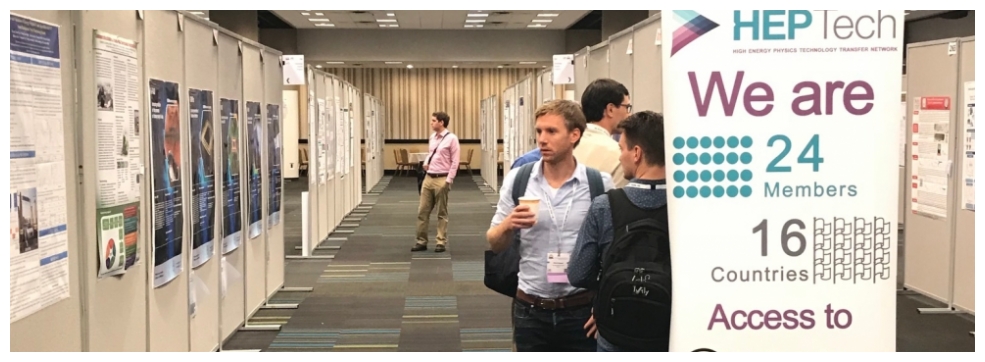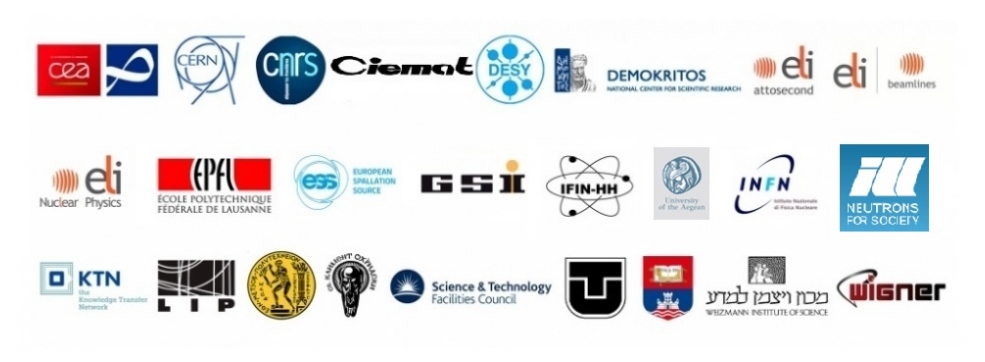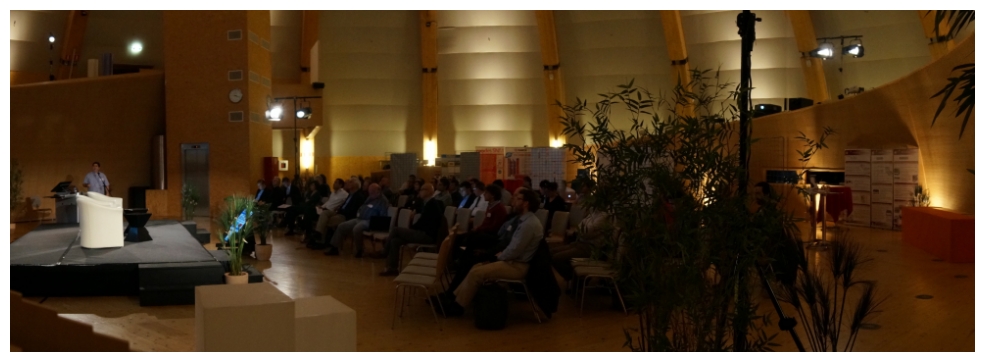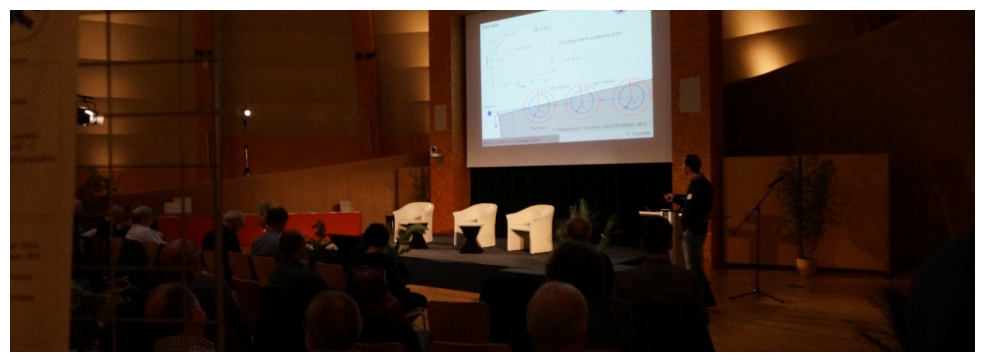From members
“Demokritos” is shortlisted for the European Enterprise Promotion Awards 2020 (EEPA) in Category 1 – Promoting the Entrepreneurial Spirit, with their project Innovation Ecosystem for Sustainable Entrepreneurship. This year 185 National EEPA entries were submitted for consideration from 27 participating countries. The EEPA National Coordinators then selected 49 of these projects for the EEPA 2020 Jury to evaluate and compose the European shortlist.
Together against the pandemic - sharing HEPTechs best practice
The CERN against COVID-19 task force was established to collect and coordinate ideas and contributions from CERN and the particle physics community, contributing to the global fight against the pandemic. At the end of May the Task Force presented the status of its work at a dedicated seminar. The CERN Knowledge Transfer Group is strongly supporting the task force, while exploring medium to long-term ways for CERN technologies to be applied to the fight against the outbreak. More
GSI/FAIR researchers are working on contributions to Corona vaccine development as well as on therapeutic low-dose irradiation options for pneumonia caused by SARS-CoV-2. Other projects aim at the development of faster and optimized virus detection and at the possibility of producing improved viral filtration masks. More
To support the investigation of the COVID-19 virus characteristics and the development of possible vaccine and treatments ELI Beamlines offers rapid access to the experimental cluster for advanced ultrafast optical spectroscopy and X-ray diffraction for research related to SARS-CoV-2. More
The newly established at Sofia University GATE Institute “Big Data for Smart Society”, has created a platform for research and analysis of the economy during and after the COVID-19 pandemic. COVID-19 Activity Tracker - CAT processes and presents empirical information on individual industries and the economy as a whole, based on constraints, imposed on the human factor. The platform can be used by government and industry organisations for economic recovery decisions based on forecast estimates. More
INFN has launched a large number of projects, both national and international, to counteract the COVID-19. The most important are the following: (i) Sibylla Biotech&INFN against COVID-19 – where Sibylla Biotech, an INFN spin-off, is studying in detail the unfolding of the protein ACE2 of the SARS-COV-2 virus; (ii) EXSCALATE4CoV is a large-scale Horizon2020 project and (iii) the Milan Mechanical Ventilator (MVM) got the EUA (Emergency Use Authorization) from the USA FDA (Food and Drug Administration) and can be used by all hospitals recognizing the FDA certifications.
LIP has developed low cost ventilators in use in hospitals in Portugal and Brasil, intended as a last resort to ventilate COVID-19 patients. The design tries to minimize the use of technical components and the construction may be possible in times of logistical disruption or in areas with reduced access to technical materials. More
At NTUA, innovative respirator devices were designed. The medical physics team together with Italian experts analysed the codon usage pattern of SARS-CoV-2 and published their work Codon Usage and Phenotypic Divergences of SARS-CoV-2 Genes. A joint university team performed simulations and analysis of the national and global data on SARS-COV-2 cases. The international project with NTUA’s participation Sewers4COVID for integrating sewer surveillance and machine learning for an early warning on pandemic outbreaks and recovery decision making in a timely and cost-effective manner, won a special award for identifying some of the best solutions to support European and global fight against the coronavirus outbreak. More
NCSR “Demokritos” interdisciplinary team of researchers proposed a solution for the rapid detection of the virus with already existing technology. This ranked them among the winners of the #EUvsVirus Hackathon competition for proposing solutions in the battle against the coronavirus. More
Two halls of the building complex of ELI-ALPS were equipped to accommodate over 100 intensive care beds for coronavirus patients in case the epidemiological situation required them. More
CIEMAT has contributed to the diagnosis of the SARS-CoV-2 virus using the polymerase chain reaction technique under quantitative conditions (QPCR). Another project aims at reducing the possibility of infection caused (i) by contacts with surfaces - from days down to hours and (ii) by aerosols - from hours to minutes. An Early Alert System of the evolution of new outbreaks of the COVID-19 infection was also developed. This tool will be connected in real time to National Health System databases. It is based on a simple mathematical model successfully tested at scale in several countries. It provides estimations on the epidemic evolution in a time period of 10 days.
The University of the Aegean was involved in many activities, among them printing 3D healthcare material (e.g. multi-purpose face shields), dynamic recording and monitoring of multiple-factor statistical data, publication of scientific articles and development of applications, such as WebGIS application for the effects of the COVID outbreak from the perspective of work and employment and a series of applications for studying the increasing SARS-CoV-2 virus literature. The full list of the UAegean interventions during COVID-19 could be seen here.
The STFC, now part of the United Kingdom Research and innovation (UKRI), has established a system of Gold, Silver and Bronze teams to plan the organisation’s response to the different stages of alert in the country. The STFC is running remote beamlines on their Diamond Light Source synchrotron and Octopus Lasers facilities offering priority rapid access for groups that require instrument time for projects directly related to SARS-CoV-2 viral proteins. Making and supplying personal protective equipment to local hospitals and providing training on testing and calibration of new ventilators are another focus of the organisation’s activities. More
More news
In the framework of COVID-19 "Stay at Home" Initiative, the Activity book for CMS Experiment@CERN has been produced and translated in several languages. As a “Demokritos” representative Michele Barone was one of the editors of the Greek version. The book is good for everyone from 8 years on and can be downloaded for free from here. Donations for educational projects are welcome at this link: https://cernandsocietyfoundation.cern/donate.
GSI Helmholtzzentrum für Schwerionenforschung and Goethe University were recently granted a European patent for their concept for an energy-efficient cooling structure for large data centers.
More
The National Centre for Scientific Research “Demokritos”, the largest public research centre in Greece, will receive EUR 48 million from the European Investment Bank for expansion and modernisation.
More




